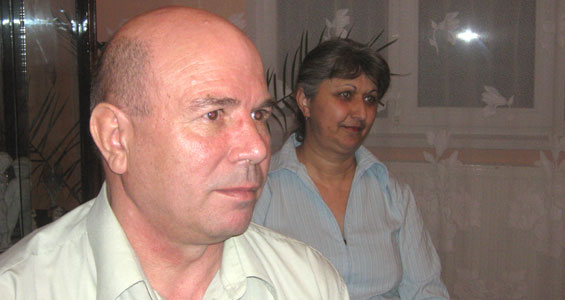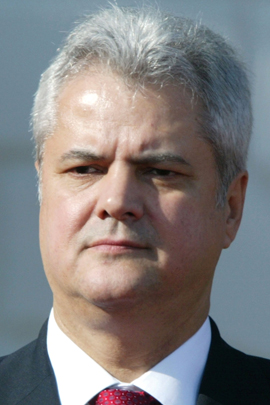Romania’s reversal of fortune
Once considered an economic success story in Europe, it has seen its hopes overturned.

 |
| Marian and Maria Florea say they worry about their future and their health after losing their jobs |
Almost every day for the past 15 years, Marian Florea, 52, has driven to work from his apartment in Mioveni with his wife Maria by his side.
They had jobs at a car parts plant on the edge of town, 130km northwest of Bucharest. They took pride in their work.
Marian still remembers the factory owner telling staff that not only were their jobs guaranteed but their children would work there too.
He thought he would have a job for life, but he was wrong.
The first sign of concern came in October when insufficient orders were placed to keep the plant working at capacity. All the factory workers were sent home on reduced pay.
It was a temporary stoppage move, but it would not be the last. Marian knew there was a financial crisis, but he was told it was in the United States.
“We were worried about our jobs, all 250 of us. We knew about the problems in America, but no one told us we were in crisis,” says Marian.
Plant closes
Then the inevitable happened. On January 12, two letters arrived at the apartment telling the couple the plant was closing; everyone was out of a job.
Two days later, as they walked into work, they were handed another letter.
It said: “The General Manager invites you to attend an organised meeting with the purpose to help re-orientate your professional career and to find a new job.”
“We knew then it was definite, nothing would save us,” says Maria.
Last year, the couple had believed that their lives were to going improve.
As their three children had almost grown up, they were thinking of spending some of their salaries on home improvements.
Medical complications
Now, however, their worries and fears come tumbling out in a rush.
 |
| Adrian Nastase, a former PM, says Romania must accept an IMF bailout [GALLO/GETTY] |
“At our age no one in Romania will give us another job. How has our life changed? Dramatically,” says Maria.
“And not for the better, it became very, very bad with that one letter. Life was a struggle before trying to pay the bills; we were just keeping our head above water. What will we do now?”
Both Marian and his wife suffer from heart conditions and they are worried that with no income their health will be adversely affected.
“We have to take a lot of medicines,” says Marian.
“Before we were taking better medicine but it was more expensive. Now we’re buying cheaper. The doctor says it increases my chances of a heart attack.”
Reduced pay
The factory their plant supplied with car parts is also located in Mioveni.
Dacia Renault is one of the area’s biggest employers; 14,000 work at the plant which still relies on most vehicles being put together by manual labour rather than automation.
Orders are up and down, and here too, the staff have had enforced holidays on reduced pay.
Marian Patrascu is a senior operator in the finishing shop, where the completed cars and pick-up trucks are literally driven off the production line.
“The financial crisis affects everyone here from the big chief to the last operator and we already felt it by spending time at home when orders dropped off,” he told Al Jazeera.
“I don’t want to think about what would happen if we closed. It would mean a little disaster.
“But it is a challenge. If we provide a good product at a good price then we can keep working”.
Most vulnerable economy
Last year, Romania was considered Europe’s fastest-growing economy; now it is its most vulnerable.
The country’s fortunes turned because people accumulated debt in euros; now that their own currency is worth less, it has become harder for them to pay back what they owe.
Add that to high levels of public debt, and you have an economy in trouble.
A team from the International Monetary Fund (IMF) is in Bucharest, the Romanian capital, to discuss a possible bailout; the figure most heard around town is to the order of $25bn.
In his large office in the People’s Palace, the country’s ornate and elaborate parliament building, Adrian Nastase, the former prime minister, thinks the government has no choice but to take the IMF’s money.
He says the politicians are guilty of not reading the warnings and acting to help ordinary people.
“We didn’t pay enough attention to the kind of ‘tsunami’ which was coming toward Romania. The signs were clear and it is bad we didn’t do something earlier”.
To get the IMF’s approval, the Romanian government is going to have to cut social spending – the programmes that help those most at risk at the moment, like Marian and Maria.
I ask Marian what the IMF money means to him. With a shrug of his shoulders he says: “Nothing. It won’t get me a job or keep me warm. The government is doing nothing to help those really affected”.
Marian thought he had a job for life. He was wrong.